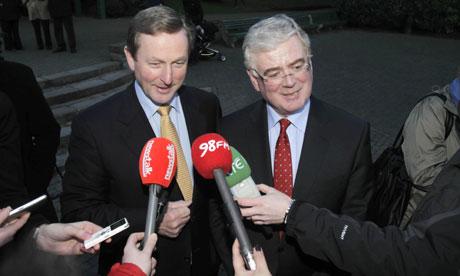Findings a body blow to Coalition's credibility

Fine Gael acted with gross impropriety in accepting a donation from Esat and then attempting to conceal it, writes Vincent Browne.
The Moriarty tribunal report seriously compromises this Fine Gael-Labour government. Nine of its cabinet ministers were part of the government that was in situ in 1996 when it (the then government) approved the awarding of the second mobile phone licence to Esat Digifone, the company then led by Denis O'Brien.
The report finds that the process through which the licence was awarded was grossly deficient and sidelined the very ministers now attempting to steer the country out of its gravest crisis in nearly 90 years. (The nine were Enda Kenny, Richard Bruton, Michael Noonan and Brendan Howlin – all senior ministers then – and Eamon Gilmore, Pat Rabbitte, Joan Burton, Phil Hogan and Jimmy Denihan, junior ministers then.)
And, worse than that, the report finds that the lead party in this and in the 1996 government, Fine Gael, acted with gross impropriety in accepting a donation from the company that was the beneficiary of the phone licence, and then attempted to conceal that donation through complicated and secretive transactions, compounding that by denying the tribunal its co-operation, while, of course, protesting the opposite.
And to underline this further humiliation for the nation, the person who is identified as the instigator of these malpractices, Denis O'Brien, happens to be the dominant figure in the Irish media industry (aside from RTÉ), with effective or incipient control of Independent News and Media (INM), the largest newspaper corporation by far on the island, and of a plethora of radio stations.
What prospect is there that the media under his control will hold him properly to account for what has been revealed? What prospect is there that a Government, reliant so much on support from the media O'Brien controls, will insist on the application of the full rigours of the law to him?
(I should acknowledge I have known Denis O'Brien since 1983 and that it was he who brought me into broadcasting through 98FM in 1996 – he is someone I have liked and from whose advice I have benefited over the years.)
The mettle of O'Brien will be tested perhaps first by how he responds to the two journalists most responsible for instituting the inquiries that now have so embarrassed him: Sam Smyth of the Irish Independent and Matt Cooper of Today FM.
It was Smyth who first revealed the endowment of Michael Lowry by Ben Dunne, and that led to the tribunals; and it was Cooper who first disclosed the links between O'Brien and Lowry.
The tribunal found that a $50,000 payment by O'Brien's company, Esat Digifone, to Fine Gael, in the immediate aftermath of the awarding of the second mobile phone licence, was made on the basis of "false and misleading" documentation, was done secretively and in a way "designed to conceal the fact of such payment by or on behalf of the donors". This does serious damage to the party, even with the lapse of 15 years.
Is it believable that this was the only dodgy donation to Fine Gael at the time, involving its main fundraiser and trustee, Michael Lowry? Fine Gael was almost broke at the end of 1994, when it fell into government on the collapse of the Fianna Fáil- Labour coalition led by Albert Reynolds. Within a year the party was flush with cash and we now know where some of that cash came from.
One of its then fundraisers, the late David Austin, a senior executive of one of the leading businesses at the time, the Smurfit corporation (whom I also knew and liked), was prepared to issue false invoices in connection with donations to Fine Gael and was involved in organising a dinner of rich corporate types in New York to raise money for the party.
The tribunal found, on the basis of evidence it details and on arguments that seem persuasive, that Denis O'Brien made a payment to Michael Lowry of £147,000 (€187,000, which in today's terms would be close to €310,000) in 1996, while Michael Lowry was still minister for transport, energy and communications, and that this was done through a circuitous transfer of money in and out of Isle of Man and other accounts.
It found also that a further £300,000stg (around €492,000 in today's terms) was paid to Lowry by O'Brien in 1999 and again this was done in a circuitous secretive manner, right at the time when Lowry was before the tribunal itself. There was also support for a loan Lowry obtained in connection with a further property.
The report is vast – over 2,000 pages – and few will get to read it in full. But its reasoning is tight (if expressed in dense form in many instances, making it difficult to follow) and any credible rebuttal will have to involve not invective against Michael Moriarty himself and the legal team but engagement with the recitation of the facts and the close reasoning.
This is a serious further shock to the national psyche and we had better deal with the consequences that should follow, unless we can be shown that the findings are unjustified.
